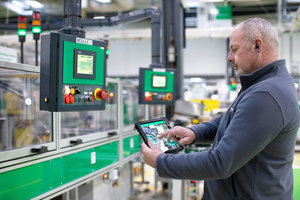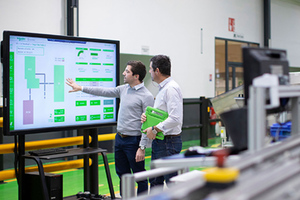

|
Edward Lowton
Editor |


|
| Home> | Plant, Process & Control | >Industry 4.0 | >European lessons for UK manufacturers |
European lessons for UK manufacturers
24 April 2024
Schneider Electric is both a digital partner and manufacturer of technology, taking the lessons learnt from investing in new smart factories across the continent and applying them to UK manufacturers, says David Barrett-Hague

AS A leading digital transformation partner and technology manufacturer in the UK, Europe and globally, Schneider Electric has established itself as an authority in the deployment of smart factory technologies. The company’s dual role as both a supplier and user in these regions gives it a unique understanding of the challenges and practicalities of deployment across a huge range of applications.
This dual perspective has revealed notable differences in manufacturing practices between the UK and Europe, while also bringing to light opportunities for rapid improvements available to UK manufacturers, especially considering recent governmental incentives and support.
Improving robotics adoption
While there are notable exceptions, UK manufacturing as a whole sees lower industrial robot deployment compared with European countries, however it is still advancing in terms of manufacturing output even when compared against countries with more robot deployment.
The UK’s heritage in manufacturing has led to the existence of legacy plants that have remained in operation for a long time. The assumption here is that older equipment is not capable of benefitting from smart factory technologies. The truth is that any manufacturing environment can benefit from smart factory approaches, and retrofitting smart capabilities can provide the rapid return on investment providing the confidence required for the more extensive digital transformation investment and continuous improvement that will make UK manufacturing competitive long into the future.
Schneider Electric’s Le Vaudreuil factory just across the water in Normandy, France was recognised as an Advanced Lighthouse in 2018 by the World Economic Forum, then awarded Sustainability Lighthouse status in 2022. These accolades make Le Vaudreuil one of only six factories globally (and the second for Schneider Electric) to receive this distinction. What this means is that the factory is operating with sustainability best practices and deploying next-generation technology to demonstrate how companies can unlock new levels of sustainability. Practically speaking, the factory sets incredible standards in sustainability that drive productivity and profitability to new heights while providing an example of a much more sustainable manufacturing future in line with global efforts to reduce the environmental impact of modern society.
The benefits of smart factory approaches
Europe's diverse industrial landscape, including established sectors such as automotive, aerospace, and pharmaceuticals, makes it an ideal setting for such factories. The region's experience with technology integration and commitment to innovation facilitates the development of lighthouse factories. These factories serve as practical examples for all manufacturers, demonstrating that smart, sustainable manufacturing is achievable regardless of company size. In this respect, there is very little difference to manufacturing in the UK when compared with Europe, though it can be argued that the UK has less space (or higher cost-of-space) for greenfield site development than many of it’s European counterparts. However, the definition of a smart factory is a digitised facility that uses connected devices to collect and share data to improve processes, and by this definition there is no facility across the UK or Europe that should see it as unobtainable.
Deploying smart factory techniques can also help address the growing skills gap in any location. While this topic may seem separate at first glance, the skills issue and Smart Factories are inextricably linked. Many European countries actively promote collaboration between industry and academia, and the UK is following suit with organisations like Primary Engineer, Imeche, GAMBICA, and Make UK which are committed to reducing the gap.
Made Smarter is another UK national movement that is backed by Schneider Electric and the UK government that connects manufacturing industries to the skills they need to drive sustainable growth, supporting the industry where new skills are needed as outlined in the most recent skills gap statistics from Oxford College which state that 58% of respondents say their employer has never provided them with training to improve their digital skills.
Addressing the labour shortage
Smart Factories can play a crucial role in attracting new talent to industrial careers by modernising and automating many of the repetitive manual elements of manufacturing, enabling businesses to attract the next-generation talent with more fulfilling and better paid job roles. Working closely with the right partner also alleviates training challenges by having the providers of the technology take on a training role, and, when combined with technology that visualises complex information, it creates the kind of interesting, technology enabled jobs which are likely to attract and retain much-needed new talent.
Significant improvements in energy and resource efficiency are achievable in existing facilities, without the need for costly new assets. Leveraging smart capabilities in existing UK facilities in the same way as Schneider Electric at their Le Vaudreuil factory in France, can lead to substantial efficiency gains. By integrating IIoT sensors with digital platforms, Le Vaudreuil achieved remarkable results: a 25% reduction in power use, a 17% decrease in material waste, and a 25% cut in CO2 emissions. Further, through the implementation of predictive analytics, AI deep learning, and integrated technologies, the factory has empowered operators with faster, more informed decision-making capabilities, contributing to a 54% business growth. This approach demonstrates that even facilities not originally designed with these technologies in mind can adapt and thrive through the integration of smart technologies, reducing waste and emissions while transforming overall performance.
Seizing the moment
The timing for transitioning to smart factory operations is opportune in both the UK and Europe, thanks to new government incentives. Building on the Made Smarter review the recently published Advanced Manufacturing Plan outlines the UK Government’s approach to supporting organisations modernise making the UK “the best place in the world to start and grow a manufacturing business", with a £4.5bn 5-year funding programme. An example of this was the Autumn Statement which cemented the permanency of a policy allowing manufacturers to claim 100% capital allowances on qualifying investments in plant and machinery, effectively reducing tax burdens for businesses advancing towards sustainable smart factory models. These initiatives reflect a strong commitment to assist manufacturers, regardless of their size or current capabilities, in evolving into smart factories.
Smart factories in Europe are a beacon of potential of industry 4.0. UK manufacturers can take the lessons learnt in Lighthouse projects yet do not need to decide the full extent of their smart factory journey in one go. Steps in data integration and robotics are just part of the journey but advancing it future proofs businesses against both known and unknown challenges. UK manufacturers unlocking the potential of data within the facility will see immediate benefits that will deliver value throughout the entire lifecycle while making the business more attractive for the next-generation workforce.
David Barrett-Hague is head of industrial automation marketing for UK and Ireland and sustainability ambassador at Schneider Electric
For more information:
+44 370 608 8608
- New Energy Opportunities network expands to Europe
- Modicon Edge I/O NTS - Simplifying maintenance and improving data continuity
- New VP of Industrial Automation UK & Ireland at Schneider
- Machine safety: Evolving to meet today's needs
- Software boosts control
- On course to meet carbon neutral target
- Schneider Electric introduces air-insulated switchgear with scalable connectivity
- Combines energy and process data
- Is it the end for traditional PLCs?
- More than a quarter of UK energy emissions generated from energy which is lost or wasted
- Introducing Industry 4.0 to SMEs
- Enhance maintenance practices
- Digital transformation: Customer insight matters
- IoT digital experiments as a service
- Smarter maintenance: Paper available
- Condition monitoring & Industry 4.0
- Smart data collection
- Mechanised welding, cutting and Industry 4.0
- Tomorrow’s tech is here today
- The business value of Industry 4.0



















